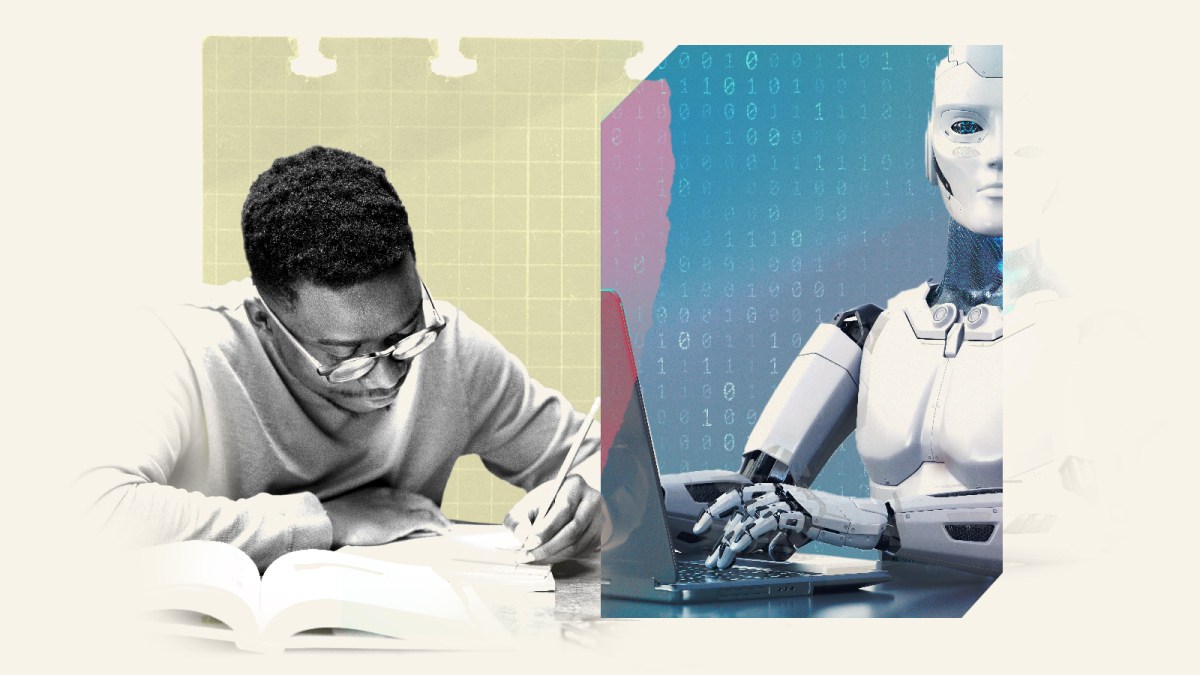Business and management has surged in recent years to become among the most popular degree choice for freshers, amid a rise in demand for career-related courses that are seen as a better investment by canny students and parents.
But the jobs usually sought by such graduates are at the forefront of doom and gloom about the impact of artificial intelligence.
What once seemed like a safe bet is being turned on its head as big consultancy firms cut graduate entry jobs as they increasingly turn to AI. Even computer science graduates are struggling to find jobs in tech as junior software developers and engineers.
Nearly 600,000 students started degrees in business and/or management in the academic year 2023-24, the latest for which figures are available, up 44 per cent from 413,000 just four years earlier.
However, the big four accounting firms — Deloitte, EY, PricewaterhouseCoopers and KPMG — posted 44 per cent fewer jobs for graduates this year compared with 2023.
It leaves parents and young people wondering what degrees, apprenticeships or job opportunities will best prepare them for the future.
• How to make Britain an AI superpower? Don’t downplay our talent
Would they be better off training as plumbers and electricians? Or is the panic about AI overblown? Can you AI-proof your career?
AI lessons: The new coding?
Schools and parents panicked that children who could not code would be left behind, but this skill has been superseded by AI.
Companies sprang up offering private coding lessons to families hoping to keep their children ahead of competitors when they reached the job market. Some experts say children should still learn it as it is good for their logic skills.
• Spend a third of school lessons on AI, says economist
Now companies have emerged offering AI training for children. One promises “future-reading AI literacy skills” and says: “AI is changing everything, let’s make sure your child is ready to lead, not just catch up.”
Parents may also turn to AI tutors to boost their child’s achievement in subjects such as maths. There has been a proliferation of such offerings online, saying they allow children to learn at their own pace. Research published in Nature found that pupils learn significantly more in less time when using an AI tutor compared with in class.
John Roberts is chief executive of Oak National Academy, which provides publicly funded digital lesson resources to schools. AI forms a key part of Oak’s new primary and secondary computing curriculum, starting with lessons on digital painting for year 1.
• Scientists and teachers join forces to police use of AI in schools
He said: “The best thing we can do for pupils is give them the knowledge and skills to understand these systems, how they work and their social implications.
“Our computing lessons help pupils to understand how computer systems work and how they’ve evolved into the AI we use every day. They explore the biases built into their underlying algorithms and assess the impact this has on the people who use them and on society more broadly.
“With this knowledge, pupils can make informed choices about how they use and create technology. This is a far more enduring approach than loading them up with ‘future skills’ that may soon be outdated.”
Are private schools ahead of the game?
The social mobility charity, the Sutton Trust, certainly thinks so. It warns that the new technology could widen social disadvantage.
Private school teachers are more likely than their state school counterparts (18 per cent v 11 per cent) to use AI tools at least once a day, according to its recent research. Only 8 per cent of private school teachers do not use AI, compared with 17 per cent in state schools.
Private school teachers are more than twice as likely to have had formal AI training than state school (45 per cent v 21 per cent). And private schools are three times as likely as state schools (27 per cent v 9 per cent) to have a clear school-wide staff strategy on using AI.
Nick Harrison, chief executive of the Sutton Trust, said: “Our research finds that private schools and some of the most affluent state schools are racing ahead. An AI digital divide is opening up quickly. We must act now to ensure that the opportunities presented by these tools improve outcomes for all pupils, rather than deepening existing inequalities.”
Could there be a resurgence in humanities degrees?
The number of students opting to study a humanities degree slid in recent years as Stem (science, technology, engineering and maths) and career-focused courses boomed.
Dr Henry Shevlin, from the University of Cambridge’s Leverhulme Centre for the Future of Intelligence, said many of the skills taught by humanities courses were key to using AI effectively, such as research and source-checking.

Henry Shevlin said it was unclear which technical skills would be most valuable in an AI world
SLAVKO MIDZOR/ALAMY
However, such degrees are at a crossroads in terms of assessment because students can use AI to write long essays — and most do — he said.
• The degrees that earn the best salaries — and protect you from AI
Asked if the humanities remained important, he said: “As a classicist and philosopher, I would like to say yes.
“It’s very unclear what specialised technical skills are going to be the most valuable.
“Junior entry-level jobs for coders aren’t looking great. That said, junior entry-level jobs for the humanities are also not looking great.
“The problem that the humanities are dealing with, possibly more so than some other disciplines, is pedagogical disruptions caused by large language models. Most courses are still figuring out how to adapt to the post-ChatGPT era when the take-home essay assignment is basically dead.
“Most educators in higher education are still fumbling in the dark to figure out how to adapt their courses. And this is going to hold back the ability of humanities education, in the short term at least.”
Of ensuring children take the right qualifications for the job market, he said: “It’s not necessarily about subjects any more and it’s not clear to me that there is a clear winner right now. Students need to think about cultivating higher-level working skills, having flexibility, being able to adapt.
“Interdisciplinary degrees, like economics, potentially offer a little bit more of that than some others.”
New graduates struggling for jobs
Graduates with masters degrees in computer science and software engineering are struggling as rising interest rates have weakened tech hiring, and tools such as Copilot boost senior productivity, reducing the need for junior roles. Meanwhile more people are flocking to the tech industry for high pay and remote work, making the competition fierce.
• Grim times for graduates facing worst jobs market in a generation
The big four accountancy firms are cutting graduate jobs but so are many other professions and industries.
The jobs site Adzuna said recently that vacancies for graduate roles, apprenticeships, internships, and junior positions had decreased by more than 30 per cent since ChatGPT emerged at the end of 2022. Advertised vacancies for graduates are at their lowest since July 2020.
There are signs graduates are turning to less traditional graduate jobs that have their own attractions.
Mercedes-Benz Vans conducted research among van drivers and discovered 46 per cent of those aged under 35 are graduates. About half said they had opted for the job because of the flexibility of choosing their own hours and a similar number said this allowed them more time for other pursuits.
Harry Bowley, 23, who delivers groceries for Tesco in Macclesfield, Cheshire, graduated with a degree in accounting studies from the University of Exeter in 2024.
He is contracted to work three days a week but sometimes works six days.
“People may think that it’s not a graduate job, but working as a delivery van driver has given me the time to enjoy life rather than having to be at a certain place, at a certain time, five days a week without the flexibility to change your schedule and then being too tired to do anything on a weekend,” he said.
“For the work I do, I’m well paid. It’s nice to feel fulfilled in a job rather than working in an office, which I would find stressful.
“Where I’m only contracted to do three days, it gives me a lot of time and the flexibility to do other stuff I enjoy. I take my dog for long walks in beautiful places and then I also make furniture on the side, which is a passion of mine.”
Are fears exaggerated?
Law degree uptake has soared in recent years but so have fears that much of the work currently conducted by legal trainees will be swallowed up by AI. It raised the spectre of growing numbers of law graduates fighting over dwindling numbers of jobs.
• Is your job under threat from the march of the machines?
However, reports of the law’s demise as a career are premature, according to Robert Taylor, associate of 360 Law Group.
He wrote on the Legal Futures website: “There’s been a lot of noise about AI replacing human lawyers. And yes, AI can do some impressive things. It can draft documents, summarise contracts, spot patterns, and find case law faster than a pupil barrister hunting for a Greggs before court.
“But let’s be honest: AI is still a glorified autocorrect with ambition. The idea that it’s ready to replace an actual solicitor or barrister — complete with years of training, finely honed judgment, and the uncanny ability to produce a five-page advice from a four-word client email — is, at best, a bit previous.”
He added: “Imagine Alexa trying to interrogate a hostile witness. And no AI on Earth can navigate the subtleties of a High Court judge’s eyebrow raise. That alone takes at least five years of training and three near-death experiences.”
